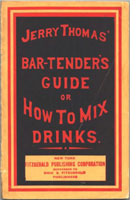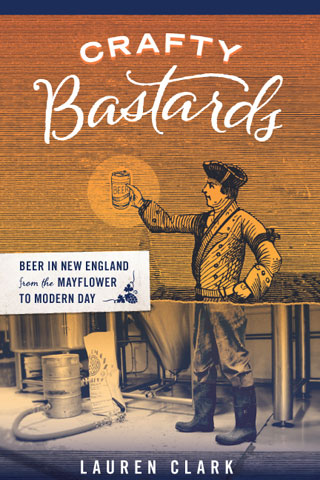March 23rd, 2007
Bartending books, bartending schools
 Todd Maul, who tends bar at the newly re-vamped Rialto in Cambridge’s Charles Hotel, emailed me recently, asking, “Could you do a posting on bartending books?” Specifically, he was curious about which books other ‘tenders around town found most useful. I decided to add to Todd’s idea and ask whether any of Boston’s libation gods and goddesses recommended a particular bartending school.
Todd Maul, who tends bar at the newly re-vamped Rialto in Cambridge’s Charles Hotel, emailed me recently, asking, “Could you do a posting on bartending books?” Specifically, he was curious about which books other ‘tenders around town found most useful. I decided to add to Todd’s idea and ask whether any of Boston’s libation gods and goddesses recommended a particular bartending school.
An informal, off-the-cuff survey yielded the following: 1) Dale DeGroff, Jerry Thomas (1825-1885), and Charles Baker (1895-19??) were the first-, second- and third-most cited bar-book authors; 2) bartending school is generally not recommended — but it’s not entirely dismissed. Survey respondents were Jackson Cannon of Eastern Standard, Brother Cleve (Boston-based cocktail historian), John Gertsen of No. 9 Park, Sean Holland of The Independent, Todd Maul of Rialto, Ben Sandrof of Noir and Max Toste of Deep Ellum. (Thanks, guys.)
Bartending books/authors
* More than one citation
Stanley Arthur – Famous New Orleans Drinks and How to Mix ‘Em
Charles Baker – Gentlemen’s Companion (aka Jigger, Beaker and Glass: Drinking Around the World) *
Harry Craddock – The Savoy Cocktail Book
Dale DeGroff – The Craft of the Cocktail *
David Embury – The Fine Art of Mixing Drinks *
Ted Haigh – Vintage Spirits and Forgotten Cocktails
Paul Harrington – Cocktail: The Drinks Bible For The 21st Century
Stan Jones – Jones Complete Bar Guide
Playboy Magazine – The Playboy Bartender’s Guide
Gary Regan – Joy of Mixology *
Ted Saucier – Bottoms Up *
Eugene Shewmaker – The International Bartender’s Guide
Jerry Thomas – How to Mix Drinks, A Bartender’s Guide *
Jack Townsend and Tom Moore McBride – The Bartender’s Book
Cannon likes Thomas for “the roots, philosophy of the trade and obscure recipe and ingredient info,” David Embury for “recipes and culture,” Gary Regan for “theory of drink relations, technique (watch his recipes though, not always sound)” and Dale Degroff for “recipe, technique and hospitality.” Holland likes The International Bartender’s Guide because, “For me, it’s organized in a way ‘my’ brain understands. I use it on the job for cocktail recipes I’m unsure of.” Maul notes that Bottoms Up has “some cool illustrations, a bit on the erotic side, but well done.” And Toste says he likes Famous New Orleans Drinks and How to Mix ‘Em for its “historical reference and background on cocktails, Craft of the Cocktail for its modern take on classic cocktails and history of barmanship, and the Playboy Bartender’s Guide for its huge volume of recipes.”
Bartending school
Cleve: “Go work for Misty (Kalkofen), John, Jackson, Ben or John Byrd.”
Cannon: “I don’t think bartending school is the way the go. I always recommend getting any job that is open in a bar/restaurant that you admire. Watch and learn from the bartenders and study [Degroff, Embury, Regan, Thomas].”
Gertsen: “I really don’t have much experience with bartending schools. I met recently with teachers from Johnson and Wales, and it seems like they are launching a great mixology program there. And finally a quote from the late Max Allen Jr. (Bartender Emeritus of the Seelbach Hotel): ‘It takes five years to learn how to bartend; the first two to learn what to do; the second two to learn what not to do, and the last year to learn how to do it nicely.'”
Holland: “Bartending schools?… well, never been. There was once a woman at [the Independent] who insisted that an Alabama Slammer was made with Absolut vodka… and she told me that she should know because she went to bartending school. If anything, I would recommend someone OPEN a bartending school — seems a lot of people go who never end up bartending.”
Maul: “Yes, I did go to bartending school. It was in 1992 in Albany, NY. I don’t remember what the name was or what it cost… I’m not sure I would recommend sending anyone to bartending school. I think picking up Sundays or that one ‘no one wants it shift’ as a bartender is the best way to get your foot in the door.”
Sandrof: “I went to the Professional Bartending School of New England. It was a week-long course consisting of five classes. I would not say that I consider it a complete waste of time, but I could teach someone all the info in a day if they wanted to learn. What it was good for, however, was allowing you to become familiar with bottles, speed pours and tools. We also had to memorize the top 30 drinks, and that came in handy. When someone asked me to make them a martini or a margarita, I did not have to stare back blankly. IT DID NOT, however, help to get me a job. I found that most people in the restaurant industry do not consider a bartending course important at all. It doesn’t hold a candle to actually having experience behind a bar. It just seems to be one more credential on a resume.”
Toste: “I don’t recommend it. I recommend going out and getting a job at a bar, watching and learning, going out to bars as a customer and observing other bartenders, reading books and stocking your bar at home. Good barmanship is as much about good service as good technique.”
Permalink | Filed under Bartenders, Books & resources |

March 25th, 2007 at 6:41 am
Whoops….I didn’t get my response in under the wire so I wasn’t included, but I have to agree with the book collection listed above. One that I did not see was the (most recent) Esquire Book by David Wondrich. Love the historical info as well as the variants he lists. It’s the classic cocktail version of the vodka and juice drinks tree!
Never was part of a bartending school. I’ve always been a believer of learn by doing. A certain part of bartending is, of course, learning the basics. But you don’t learn how to shut someone off, deal with an unruly customer or tackle the real life situations one encounters during regular service until you are standing behind a bar.
March 25th, 2007 at 3:11 pm
Thanks for including Wondrich, Misty. He certainly deserves a spot on this list, and unlike several of the examples here, his books are easily obtainable!
March 26th, 2007 at 6:01 pm
I recently read Regan’s “Joy of Mixology”, and I think David Embury is spot on: the early history of cocktail making is fascinating and his cocktail taxonomy is useful, but I’m not crazy about some of his drink recipes. I was generally disappointed that the bulk of the book was devoted to recipes, as I have vintage and modern bartending guides galore already.
March 27th, 2007 at 2:49 am
egullets cocktail forum…..that is the best modern source….you can learn anything and ask question and get responses from the smartest people in the industry….
my biggest cocktail influence is everything I learned about wine….how to respect nuances…..depth, structure, avoiding the cloying sweet….when you need sweet, when you need acid, when you need alcohol….flavors that are so integrated they become something new….flavors that are more discernable but roll across your tongue….blending techniques of good wine makers….
the best advice i ever got about bartending….”don’t be afraid of a jigger…”
cheers!
March 27th, 2007 at 3:40 am
Part one of the posting is invaluable for all cocktail enthusiasts—recommended reading from the very folks you’d want recommendations from. Great move.
And as someone contemplating whether and how to make a move into bartending (the alternative being to simply learn as much as possible for personal pleasure and improved hostessing), I was heartened to see this sampling of responses, including the above comments. This was exactly the kind of multiperspective info I searched for but didn’t find elsewhere. Kudos!
March 22nd, 2008 at 6:05 pm
Thanks for including Wondrich, Misty.
June 25th, 2008 at 6:30 pm
I think some crappy bartending schools give good bartending schools a bad name. As an owner of a school, as well as a bar owner I feel that may students do get a valuable education. It is true that some people have a natural talent for bartending and can learn from observing–but that’s not the case with everyone. I have students who have no idea what vodka looks like! And it would take an enormous amount of time for someone to work at a bar and observe in order to gain the knowledge that we teach in 32 hours. And who says you’re learning the right things. I know a bartender that has been working for 12 years that thinks bourbon and brandy are the same. A lot of “beertenders” out there!
September 22nd, 2008 at 4:38 pm
This has been so helpful – getting the opinions of others. I just did my first bartending gig yesterday (with no school) and was wondering whether or not to go to school; but first i had to see if i liked it – and i loved it – i felt at home right away behind the bar. It was a one-time, friend did me a favor spot, but i’m looking forward to getting back out there as soon as possible. I would definitely say that hands on is the only way to go. Schools may be helpful in teaching you specific drinks, but every bar is different – in set up, clientele, etc. it’s just a matter of making it feel like home – like riding a bike, pretty soon you don’t even think about it. anyone need a weekend bartender in central Jersey:)?
February 23rd, 2009 at 8:58 pm
I too believe first hand experience from a professional is the best way to learn a skill. However, at the DrinkMaster Bartending School of Boston, you get first hand experience from the first class. DrinkMaster does a good job at creating a real bar environment with loud music, taking customers orders and working in a functional bar. Check out theur webiste and enroll. http://www.drinkmasterbartending.com/
November 2nd, 2010 at 12:06 pm
Texts like this are great, but you def have to go above and beyond to get that first job. As Laurie mentioned, its also a great idea to get some real behind-the-bar experience to be sure that you actually like the work itself.
http://www.bartendermixed.com/